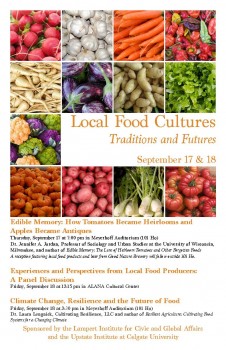The role of regionally-based food systems, their role in our history and culture, and the promise and perils of depending on locally-sourced food in coming decades was the focus of a series of events in September, held by the Upstate Institute and the Lampert Institute for Civic and Global Affairs at Colgate.
“Edible Memory: How Tomatoes became Heirlooms and Apples became Antiques”
Dr. Jennifer Jordan, Professor of Sociology and Urban Studies at the University of Wisconsin-Milwaukee
How do the stories we tell each other about the past shape the food we eat? Even as countless varieties of edible plants have vanished permanently from the face of the earth, people are working hard to preserve the biodiversity and “genetic heritage” not only of rare panda bears or singular orchids, but also the plants of the backyard vegetable garden. A major consequence of this work is the emergence of heirloom food—varieties of fruit, vegetables, grains and livestock left behind by modern agriculture, but now experiencing a striking resurgence. Through a close examination of apples and tomatoes, this talk reveals the phenomenon of edible memory—the infusing of food, heirloom and otherwise, with connections to the past, in ways both deeply personal and inherently social. Paying attention to edible memory reveals deep connections between food and memory, social and physical landscapes, pleasures and possibilities.
Panel Discussion: “Experiences and Perspectives from Local Food Producers”
Featuring three local local food producers discussing their work in our region.
Part of the Environmental Studies Brown Bag series
“Climate Change: Resilience and the Future of Food”
Dr. Laura Lengnick, Cultivating Resilience, LLC
Part of the Division of Natural Sciences and Mathematics Lecture Series
Climate change is upon us and agriculture is inextricably involved. Fundamental to our identity as a species, crucial to the health and well-being of our communities, the way that we eat fuels the 21st century challenges that threaten our way of life. How do we resolve this dilemma? The geographic concentration and specialization of agricultural production in the U.S. create unprecedented challenges to agriculture, particularly in Pacific west, Midwest and southern states where much of the U.S food supply is produced. A review of food systems research converges on two key changes that together would enhance the resilience of U.S. food supply to climate change and other 21st century challenges. We must transform production methods (from industrial to sustainable) and geography (from regional specialization to regional diversity). Leading sustainable farmers and ranchers across the country offer proof of concept – they have been resilient during a period of intense concentration and consolidation of the food system, manage impressive diversity, and sell high quality foods into direct local and regional markets. For more than 40 years, these farmers and ranchers, with the help of sustainable agriculture researchers and educators, food activists and consumers, have been busy laying the foundation for a New American Food System that has the capacity to produce abundant, high quality food, enhance community health and well-being, and provide critical climate protection services.



